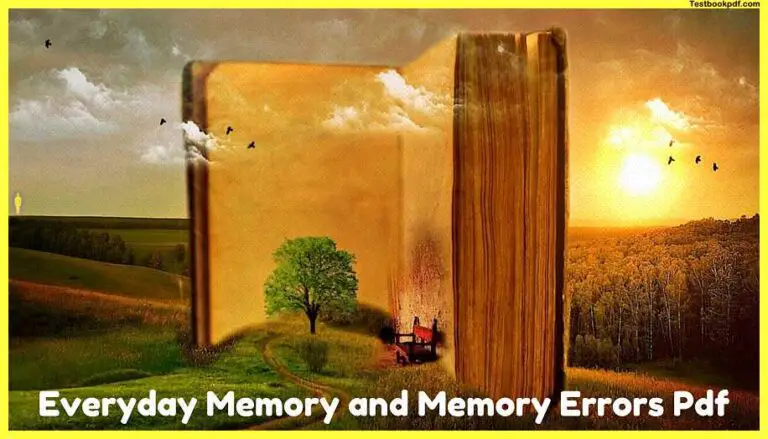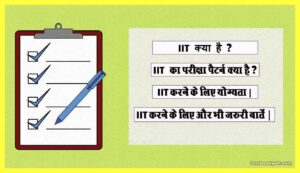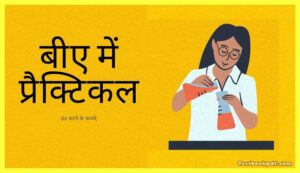Everyday Memory and Memory Errors Pdf
We have been talking in the last few articles about memory. Everyday Memory and Memory Errors Pdf, Today will be the last article on memory, we will be talking about everyday memory and memory errors.
The focus of this article is well evident from the title itself. It covers
- Autobiographical memory
- Specifically memory and emotion
- Flashbulb memory with experimental findings.
We will also talk about the constructive nature of the memory with a focus on source monitoring and misinformation effect-eyewitness testimony. In the later part, we will brief about the errors associated with attention, errors due to familiarity, suggestions, and finally the effect of post-event questioning.
Now when I say everyday memory, I am basically talking about memory as we know it, memory as we talk about memory. We talk about
- Memories of events.
- Memories about episodes in our life.
- Memories of people.
- Memories of small scales that you might have learned.
But we do not really describe how we learn those skills.
For example, an interesting episode that happens once you learn to drive or an interesting episode that you happen when you attended a particular class, and things like that.
Now that is the kind of memory we know and we have been talking about, and we have been let us say studying about in the past few articles as well. But today, we will look into it from a different perspective. We look into how memories play a role in our daily lives. And also we will spend a considerable amount of time talking about whether and how we make errors in memory. So you will see the topic of the article to be is everyday memory, memory about everyday events and the people and stuff like that, and also memory errors.
Do we make errors in memory?
Is our memory 100% correct all the time?
So we spend a considerable amount of time on this, we will try and see whether our memory is accurate or not. If it is not, then why it is not accurate, what are the factors, and what are the sources that make our memory less accurate, than we assume it to be? If you ask a layperson if you ask people generally about how good or how bad their memory is, some of them might say that my memory is not very good, I do not remember details of events, I do not remember names of people or faces of people. Or say, for example, I do not remember things about say for example numbers and figures and those kinds of things.
Now that is one way of describing memory, we will probably talk about cases, where people do remember stuff, say, for example, episodes and their episodes about, let us say a birthday party that you celebrated 20 years ago, you might remember all of that in a lot of detail. But is everything that you are remembering correct is everything that you are remembering part of your memory? So those are the kind of questions we will talk about, generally, people are very confident, and a lot of people will say that I have a photographic memory, what is actually, what do they mean by saying photographic memory, do they remember everything in as much detail as a photograph has, or let us say they are just merely confident. Anyway and these aspects of memory are very important, and they play a major role in a lot of areas in our life. Say, for example, in the criminal justice system, the confidence with which a particular eyewitness describes his or her recollection of a particular criminal act or criminal event, kind of definitely influences the judges or the jury about whether this person is identifying the correct criminal or not. Or say for example, if this person remembers their event in adequate detail or not.
Now, these are cases wherein, the accuracy of memory actually becomes very important. And there has to be a way to know whether and what the person is remembering is correct or not. Also, it is important to realize that a lot of times we do not ourselves know whether our memories are correct or not. A lot of time she would say no I remember confidently that this person had met me in the place X and we were doing some action way or something like that. And to your surprise sometimes somebody could come and tell, I am not that person or probably I did not meet you there, I met you at a different place, we were doing something different, than you are saying. And those kinds of corrections sometimes come as a big surprise, sometimes people will not believe them, they are very important in the sense of understanding that our memories are not always accurate.
A.J
Let me begin the article today by talking about somebody who believes that their memory is correct most of the time. So this is the memory, this is the recollection from a patient called A.J. And this patient had this photographic memory.
She says, I am 34 years old and since I was 11, I have had this unbelievable ability to recall my past. I can take a date between 1974 and today, and tell you on what day it falls, on what. I was doing on that day if there was anything of great importance that occurred around that time, and these details. This person says, that whenever I see a date flashing on the television I transport it to that place automatically. I remember all of that happened on that particular day almost in detail.
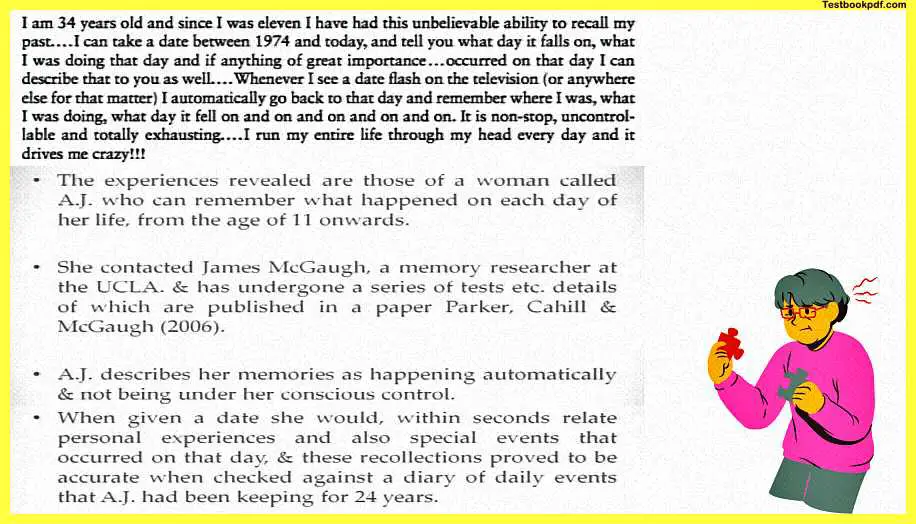
Now the thing is this, this becomes a slight hazard for the person as well, because it is not stopped, it is uncontrollable and it becomes rather exhausting for the person, you might enjoy something like this happening for a short while, but if it is happening continuously it is out of your control, and it is happening with each and every date that you were reading somewhere. It can become that much of a hassle. Ao, this patient A.J basically conducted James McGaugh was a researcher at UCLA. And James McGaugh basically conducted a series of tests of the details which you might find in the paper by Parker, Cahill, and McGaugh published in 2006. But this is interesting, where this person describes in memories is happening automatically and not under her conscious control. It is like you tell the day to the person, and the person is almost time traveling to that instant and living the entire day.
Now, this is interesting. When given a date she would actually within a second relate all the personal experiences also any special events that might have happened that day, and these recollections proved to be accurate if checked against a diary of daily events that this person has been keeping for almost 24 years. Also might have come out a story feet with cross-checking with other people around time, or around that person at that time.
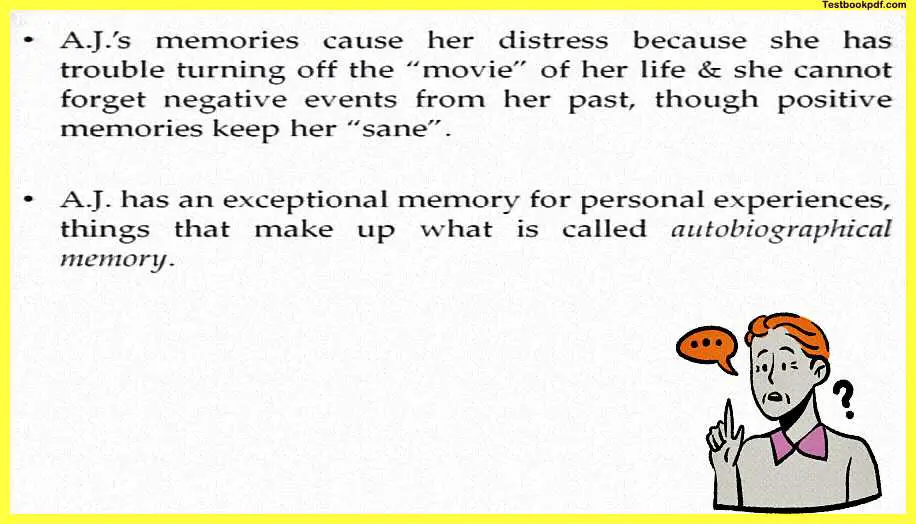
Now these memories basically, because they are constantly out of our control and they are treated all the time, started causing this person distress. And she says that it is trouble for me to tell this kind of movie off and I cannot forget the negative events from the past, the positive memories also kind of keep the balance.
Autobiographical Memory
Now, this is something which one should reflect upon and say that in life, there are so many things that happen, there might be good things that are happening, there might be bad things that are happening, and memories of everything. There is a reason why, we do not constantly remember everything, because we have to move on in life. So if somebody is suffering from this kind of a disorder and not really call it to disorder, but this kind of ability when everything is almost alive all the time, whenever you see a date you try to remember all the negative things, all the positive things as well, it becomes a kind of problematic after the point.
Now, these kinds of memories, memories of your experiences in a given time frame are referred to as autobiographical memory, these are memories or personal experiences. What was happening with you when you are at a particular point in time what was happening with you let us say when you are at a given place on a given date what was going on say for example what was happening on a particular day say for example 20th September in 2015 if you can remember all of that in detail let us say some of you are birthdays might be on that day. And you remember the party you remember the kind of cake that was there you remember the kind of people that you invited and what all happened during that party. That is basically part of what is called Autobiography in Memory.
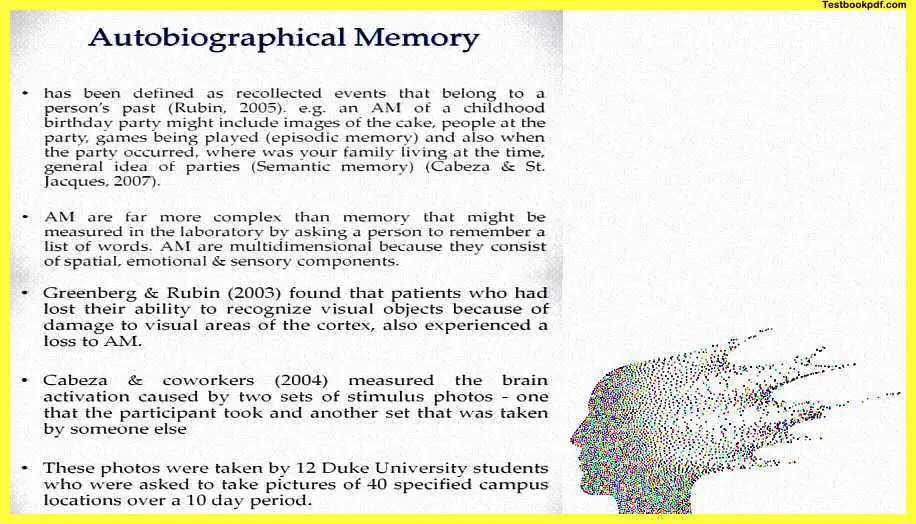
Now let me try and formally definite is so autobiographical memory has defined. Recollected events that belong to a person’s past so it is obviously about the past and it is basically, for example, things like what I have been talking about so and autobiographical memory of childhood birthday party might include images of a cake people at the party games being played all those kind of things.
Now this memory or autobiographical memories are slightly complex they are more complex than something that might be measured in a laboratory. We have been talking about in the past in the last 3, 4, and 5 articles about the kind of recall test were taken simply we were talking about somebody giving a particular list of fruits of animals or objects, and we asked the participants who learn that list and recall test can be taken easily but autobiographical memory is that much more complex to test because first, you do not really have a way to verify other than is in the case of AJ there was a dairy that she was maintaining. You might as well have people around that person who might very that but also because of the fact that these memories are more often they are not charged with some emotional information they are charged with details that you cannot really verify and they also have a lot of letting us say things that the person might have made.
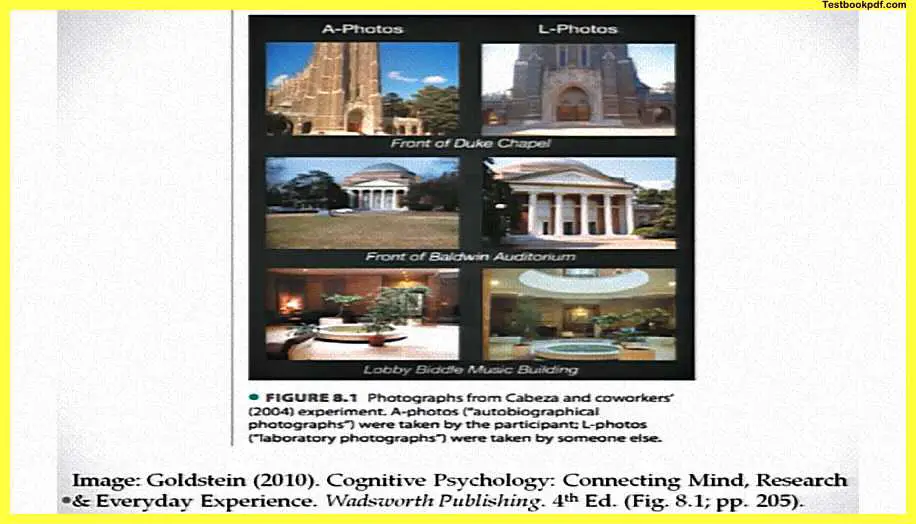
So we will talk about this major part in a short while but the point here is just to say that these autobiographical memories are multi-dimensional. Because they contain information about the special location where I was at that point and time what was I doing where was I sitting suppose say for example I am in a particular restaurant I was sitting on that particular table we ordered this food for the dinner those kinds of thing they would also have emotional components I was happy I was sad I was in a bad mood I was in a good mood I was so happy this thing had happened I was anticipating all of those details.
Also a lot of times these autobiographical memories have sensory components so you might have vivid images you might have vivid sounds that you are reliving at that point in time you might also have things like I tasted this particular dish at the restaurant and it was amazing so autobiographical memory in that sense is a much more complex form of that is why I say this is the memory we generally talk about when you are talking about memory in the lament. So it is not completely as simple as the experimental test memory that we have been doing let us talk about some experiments that have been done in this area.
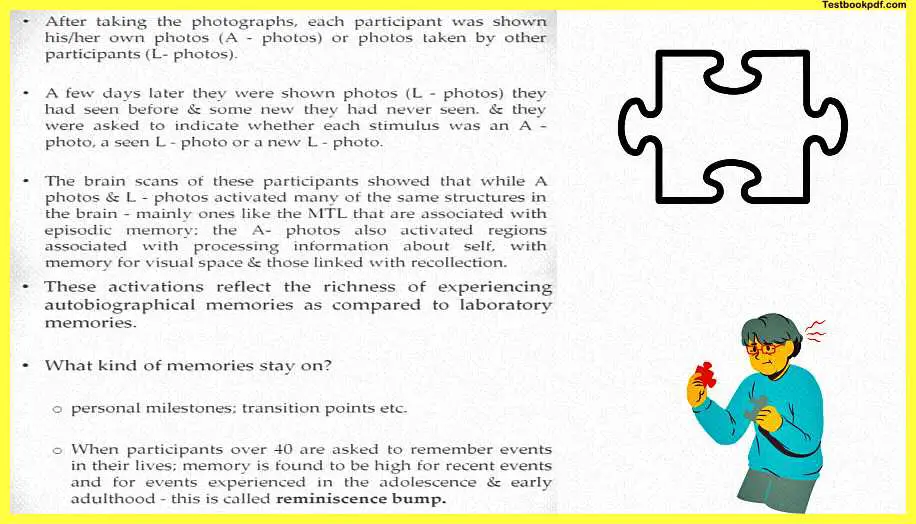
Now green berg and Rubin found that patients have lost their ability to identify or recognize visual objects because of damage to the visual areas of the cortex. Mainly the occipital lobe and associating areas also experienced the loss of the autobiography so the special visual component of the autobiographical memory might be damaged if you have damage in the occipital lobes of the brain Cabeza and workers 2004 measured the brain activation caused by 2 sets of stimulus photos so they conducted this experiment in their lab in Duke university. And these photos were taken by 12 Duke university students they were basically asked to take 40 pictures of the campus over a 10-day period picture that these people took themselves were called autobiographical photos and there were 40 other photos that were taken by somebody else of the same places so I will show the figure here. So you can see there are autobiographical photos and they are laboratory photos again this is the source from Goldstein’s book and the chapter on memory and this is basically the kind of photos that these people were taking.
Now after taking the photographs each participant was shown his or her photos autobiographical photos which are aunt photos taken by the other participants.
Which are called laboratory photos?
Now a few days later again they were called to the lab and they were shown the laboratory photos they had seen before and some new photos which they had not seen they were asked to indicate whether the stimulus was an autobiographical photo seen in a laboratory photo or a new laboratory photo. So they were basically asked to tell this is the picture where I have sourced this from is it the picture that you took is the picture that you have seen earlier and was a laboratory photograph or is it a new laboratory photograph that you have not seen earlier and while these people were making these recognitions they were also in the scanners so FMRI was ON and they were basically being scanned.
So these brain scans are these part is been shown that while autobiographical and laboratory photos both activated some of the same structures in the brain mainly the areas in the medial temporal lobe that are associated with episodic memory the autobiographical photos also activated regions associated with processing information about self with memory for visual space and those linked with recollection.
So what it tells us what this kind of result tells us is that autobiographical photos have this extra component of self-based information of information that is attached to the self if you remember one of the earlier articles we talked about the self-reference effect we have talked about the fact that when you associate information to yourself your recall of that information is better autobiographical memory is slightly similar in the scene. That this memory is actually about you so autobiographical memory or recalling events that are autobiographical in nature will in addition to the medial temporal lobe areas also activate the areas which are associated with self-processing or self-based information processing in your brain.
now moving ahead one can also question what kind of memories typically come under typically figure under autobiography memory what kind of memories are these and how do people recall them? what are all of the things that can figure here so memories of things like personal milestones? Transition points in your life things like when you archived something important when you passed a very important exam when something significantly good happened in your life also sometimes significantly traumatic events are also remembered things like transition points when you passed a school went to college when you graduated from college and maybe went for a job may be one of you may be said for example when some you have married all those transition points in eth life are also significant positions of the autobiographical memory. And I remembered in organized as such so when you start thinking of these events you are kind of also thinking about yourself placed in these situations you are not remembering these memories just has facts or just has episodes there is this extra component of self-based processing here.
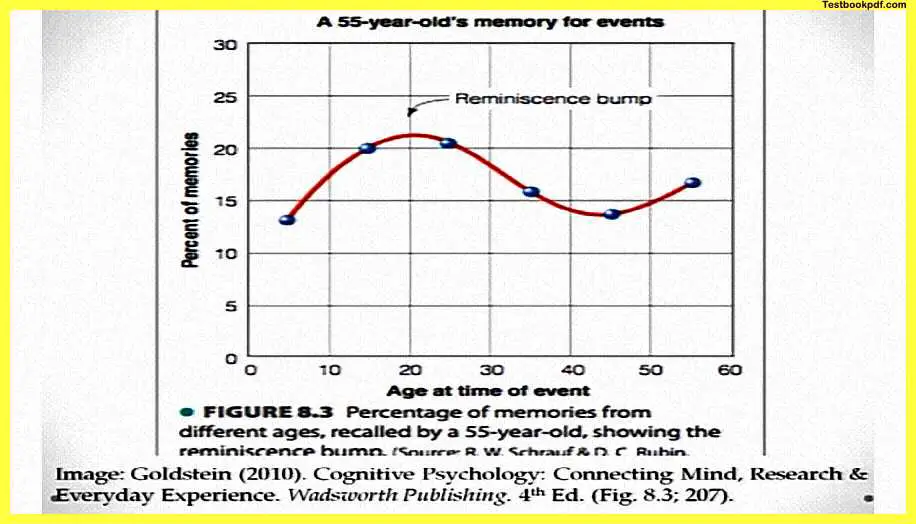
now when participants are over 40. Generally are asked to remember these events in their life’s their memories sound to be high for recent events and for events experience in adolescence and early adulthood things like say for example events that happened when somebody was in their late teams and early ’20s in those kinds of events now this enhanced information for this particular period is referred to as the reminiscence bump. So you will see the figure here and you will see that while the memory for the recent events is very good and memory for too far events is not really good but there is this bump here, so there is this age group between let us say as an I was saying earlier 20s and late here which is particularly vbt in participants maybe you will see there is a slump of information from 25 onwards till let us say 40 but there is this significant bump in almost the participants and this is maybe a 55-year-old person.
So this is basically interesting and you can see say for example even if this is was tested in case of emigrated people who emigrated at the age of 34 you will see that the emigration age kind of corresponds to this remises from because this is a such a significant event that was happening in that into these people life’s there were shifting countries they were arriving at a new place may be looking for a new job may be looking for new homes those kinds of things so that kind of correlates.
These particular reminiscence bumps also correlate with the fact that when something significant happens in life the memory for those kinds of events or maybe for events around that time period or specially enhanced, now could be possible explanations for this reminiscence bump and there. Rathbone and coworkers basically proposed at memories are enhanced for events that occur as a person’s self-image for life identity are being formed so the kinds of events I was mentioning passing from college getting a job or getting married that these kinds of events do play an important role informing yourself image and do clear and see for example once you passed college and you come up with the particular in a job that job kind of adds a lot to yourself we say for example somebody becomes a doctor or somebody becomes an engineer or somebody becomes marketing specialist.
Now you will start identifying adds these professions and also you might start identifying that I am extending and I am doctor, so these kinds of events are playing a particularly important role informing yourself image, so the Rathbone and coworkers would say that because events are playing such an important role in helping you form yourself image that is why these memories are recalled much better than some of the other memories, now there is another angle this is a cognitive hypothesis.
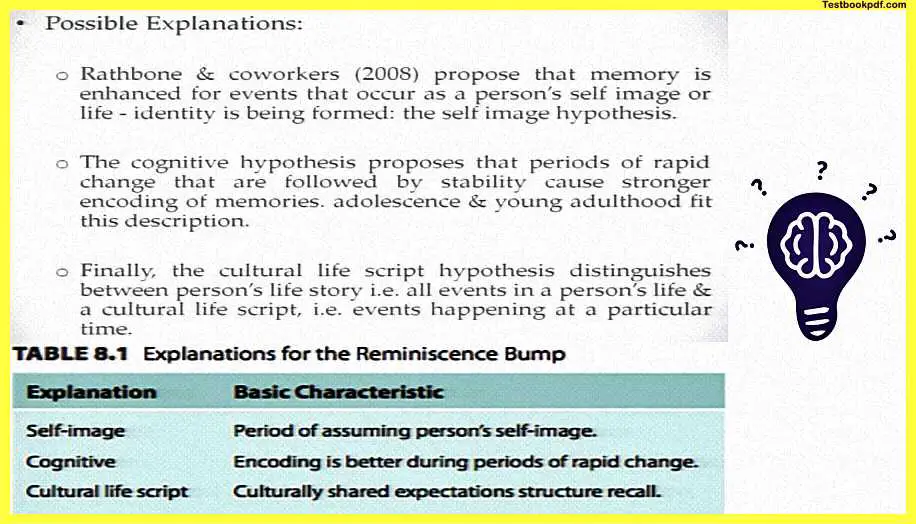
The cognitive hypothesis basically proposes that there are periods of rapid change followed by eras of stability which cause better and stronger encoding of your family so that why these memories are remembered better so things like adolescence and young adult perfectly fit these kinds of distributions, so adolescence or just when you just transitioning into adolescence or say for example we were transitioning from an adolescent to a younger adult in your 20s those are special times of turbulence. We were quietly few things are happening to people in this point in time or going through a lot of turmoil emotionally and otherwise and these kinds of things are generally followed by your relatively stable areas in life relatively stable periods, and so these relatively stable periods might allow for the better encoding of those events at happening earlier adulthood or adolescence and in that sense, they would only lead to better recall again this is what are the other explanations of the same thing.
Now there is a third explanation well the third explanation is called the cultural life script hypothesis.
Now the cultural life split hypothesis basically says that events that happen in a person’s life story is all the events in a person’s cultural person’s life and a cultural life script events having that at a particular time.
For example when I was 18 years old versus in I was 24 years old versus say for example 16 years old these kinds of events have some special significance in when say for example. If I say down some point at some point in time to write my autobiography and because these events are that much more important that is why I will make a special case for them and remember them much better than I will remember some of the other things that would happen around that time these are three possible explanations people have given to explain of reminiscence bump.
What is called the Reminiscence Bump?
So the reminiscence bump is what reminiscence is when you recall information from particular periods of time slightly better than periods after or before that particular period. So this is again comparative of these three kinds of explanation self-image period of assuming somebody self-image cognitive and coding this better in periods of rapid change so it is cultural life so it is culturally shade expectations structured you call so at that point and time the people are in your culture expecting you to get a job or say people in the culture expecting you to get married so these kinds of cultural importance laid on that particular period help you better recall is. Helps you better organize this kind and that is why the better recall is there.
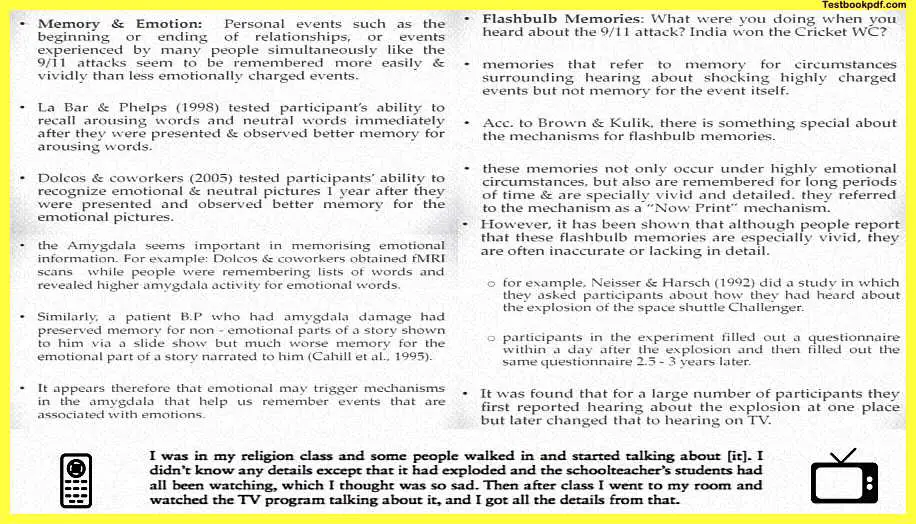
Now let us move further is also as I was saying in the autobiographical memory and enhanced portion. Emotion is an enhanced aspect of emotion at asked and you can talk about many of the autobiographical memories you might say for example pass the video take 10 seconds of taking a minute and think of all of the information that you are remembering about your past from this movement backward if you doing this experiment but you might realize, and if you might want to tabulate third you might realize that you remember particularly those events better that were associated with highly emotionally charged events highly emotionally charged happenings and this probably is the case with the everybody.
And that is why it is very important to look into the emotional component of autobiographical memory so personal events such as say for example beginning or end of relationships or say for example events that are experienced by many people simultaneously something big say for example as happens to say for example in 9.11 attacks in the United States of America these kinds of events tend to be remembered much more easily and much more vividly than some of the less emotionally charges. See for example you going to the market to buy a pair of Jeans is much less emotionally charged as compared to you went to the restaurant with the data something very interesting happen in your family so you have to kind of understand why each of these events is being remembered better, now in the La Bar & Phelps in 1998 the tested the participant’s ability to recall arousing words in neutral words immediately after they were presented and they already observed better memory for the arousing words. Arousing words are those words that would create an emotional turmoil or an emotional disturbance in your mind.
For example, if I say would like disgusting or if I say would like come to the word disgusting kind of has this extra negative valiance attached wait and it might b recalls slightly better than the word like stoic or calm or something like that.
so already we know that emotional words have processed slightly, especially in the memory and the recall is better now Dolcos and coworkers basically tested participants’ ability to recognize. Emotional and neutral pictures one year after they would be presented and still observed better memory for emotional pictures so somebody could show you serious of photographs some maintain photographs let us say everyday happenings and some slightly charged emotionally charge for the say for example pictures of the birthday party or say for example on the other hand pictures of an accident or something like that and even after one-year peoples memory for these emotional pictures. Have been found to be higher so one can say please say at this point in time that emotionally information is processed just slightly different than other kinds of information and your recall for emotional information in that sense will be better
What is the area in the brain that might be helping us to do it?
So the amygdale among all the areas of the brain that we have been talking about that are implicated in memory, amygdale seems to be the most important area in memorizing emotional information. Emotional information is things associated with positive emotions as well as things associated with negative emotions like fear etc and amygdale is supposed to be one of the very important areas in doing this. So I will take an example Dolcos and coworkers obtained an fMRI scan when people were remembering a list of words things like the arousal and calm words and this basically revealed higher activity in the amygdale for the recall of emotional words. So it is already being shown in some way, that amygdale might be involved in recalling or encoding or retrieval of these emotional words.
Now also a case from neurophysiology there is a patient called BP, who had this amygdale damage and so he was found to have preserved memory for the non-emotional parts of a story shown to him via slide show but much worse memory for the emotional part of the story, see the patient was taken particular slide show was arrange which had long story parts of that story were highly emotional parts of the story your other mundane and it was found that because this person had amygdale damage, he had much worse memory for the emotional part of the information. Again so it appears overall that emotional information which regards mechanism in the amygdale will help us to remember events that are associated with emotions. Again remember amygdale is one of the older brains structures and recalling or processing emotional information might also have evolutionary benefits for people, say for example things like highly charge positively emotional event might have survival values or highly shared in the negative event might have values about adaptation that one has to adapt to a different kind of a stator.
Now another kind of memory again part of the auto-bioregional thing is the flashbulb memory.
What are flashbulb memories?
Say for example if I ask you if say for example you are in the US at that time, where were you? When did you? What for you do when you first heard about the 9/11 attack? Or let us say closer to home what for you doing when India won the 2011 cricket world cup? If I ask you questions like this you might have some description, you might have some recollection of this particular event and some of you might have a very vivid memory, I was at this place watching the match with my friends, we were having food, and we did this after India won the finals or we say for example went to a particular place for a party all of these people were inviting, So these kinds of memories are called flashbulb memories, now memories, if you try and define this memory, that refers to memory for circumstances surrounding hearing about highly charged events, but not the memory for the event itself.
So I am not really talking about the details of the match here, I am talking about what you doing when India won the world, say for example you are someplace or somebody called you and told you this. You will not really have information about the event per say what you will have information about what happened around that time when you heard this news, what happen when you first heard about the 9/11 attack, what happen when you first heard about let us say the assassination of a particular assassination of Rajiv Gandhi for example. These are some of the events that could be rather vivid and they are existing as flashes because you kind of remembers a flash of all of that information in finesses.
Now according to Brown and Kulik, there is something special about the mechanism for these flashbulb memories, so what is that? These memories are not only occurred in that highly emotional circumstances but are also remembered for a longer period of time. So they would say that flashbulb memories are remembered for a much longer period of time than ordinary memory says for example simple episodes you got Symantec memory kind of things. Also, they are saying that they are especially vivid and details so somebody could actually go into a lot of detail and tell you there are was doing these things I was eating this, I have wed these people when you called and told me to let us say that India won the cricket world cup. So they are referred to this they refer to this particular machine as a now print mechanism because you can really in detail you have everything organized you just have to press print then all of that information will come out exactly as it happened at that point in time.
Now, this is about what people have destined about this. However, a lot of subsequent research has shown that although people report that these flashbulb memories are especially vivid and they tell that they are often very accurate and I am very confident about this, a lot of research has shown that events or these memories are rather inaccurate some times and they lack a lot of details. So I will describe an experiment of this kind say for example Neisser and Harsch 1992 did a study in which they ask the participants how they had heard about the explosion of their space shuttle challenger, and participants this experiment what did was they filled out a questionnaire within a day after the explosion and then filed out the same kind of question, 2.5 to 3 years later. And it was found in this experiment that a large number of these participants when they refer we put it hearing about the explanation at one place let us say Pago at somewhere, the later after 2.5 to 3 years change it to that of hearing on TV.
9/11 World Trade Tower Incident
So I will see what is an example, so this is a response of one of the participants. So I was in my religion class and some people walked in and started talking about it, I did not know about any detail that it exploded and the school teachers and students had all been watching which are thought was so sad, so that was then after the class I went to my room and watch the TV program and learned about it. This is somebody’s recall just one day after the event. After 2.5 to 3 years two And a half years later the same person describes this event like this so when I first heard about the explosion I was sitting in my fresh men dome room with my roommate and we were watching TV, it came on a news flash and then we learned about it. If you see after 2 to 3 years a fig people might not recall the exact events or exact circumstances surrounding that thing but they might recall the event in some detail. So that is something special about flashbulb memory, another experiment about flashbulb memories was done by Talarico and Rubin in 2003.
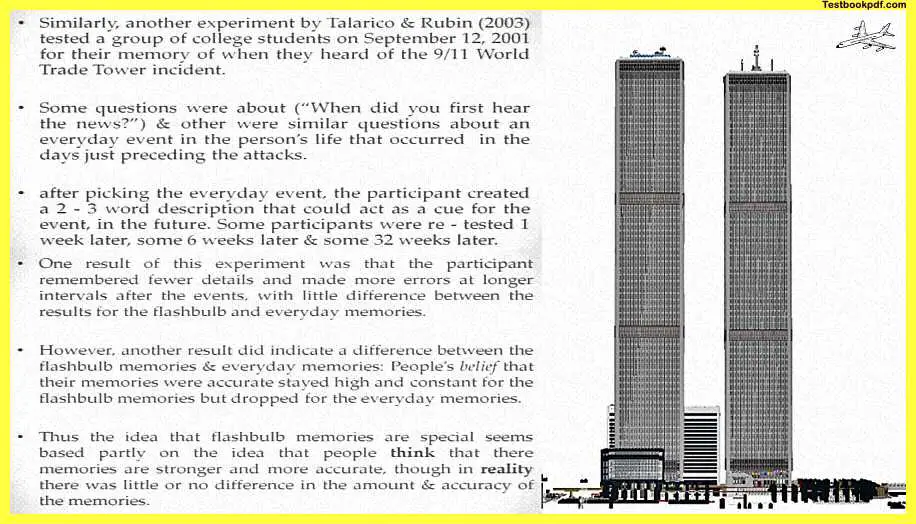
So what they did was they tested a group of college students on September 12 2001 a day after 9/11 and they ask them questions like when did you first hear the news and other similar questions about an everyday event that happen in a person’s life, that occurred in days just perceiving that. So two kinds of information you are taken one kind about the event and the other some normal Monday in detail about where did you buy your milk from or something like that. After picking every day even the participants had to create two to three words descriptions that could act as a queue for the event in the future, now because this needs more help to be recalled.
Now some participants were retested one week later some six weeks later and some 32 weeks later on both the events.

Now one of the results of the experiment was that the participants obviously remember fewer details and made more errors longer in travel after the events with little difference between the normal everyday events and the flash bulb memory of 9/11. Let us say that another result was that it did indicate a difference between flash bulbs another finding indicates the difference between the flash bulb and everyday memory, what is this difference? The differences in people’s beliefs, so what they find is that peoples believe that their flashbulb memory is were accurate stat e much higher for the flashbulb memories but did not stay constant for the everyday event. So I show you the figure here. So here you can see on the right side that people’s belief about everyday memory is much known but people’s belief about the flashbulb memory B accurate on a 7.80 rating scale still says much higher their information in terms of detail might not be as good but they believe in a fact that these memories are accurate was much better.
Now another experiment again about 9/11 acts Davidson & co-workers in 2006 asked participants as questions such as how did you hear the news where were you when you heard about the attack and who was present at that point in time and they also had participants again answer questions about an everyday event the most interesting event that had occurred in the few days just preceding 9/11.
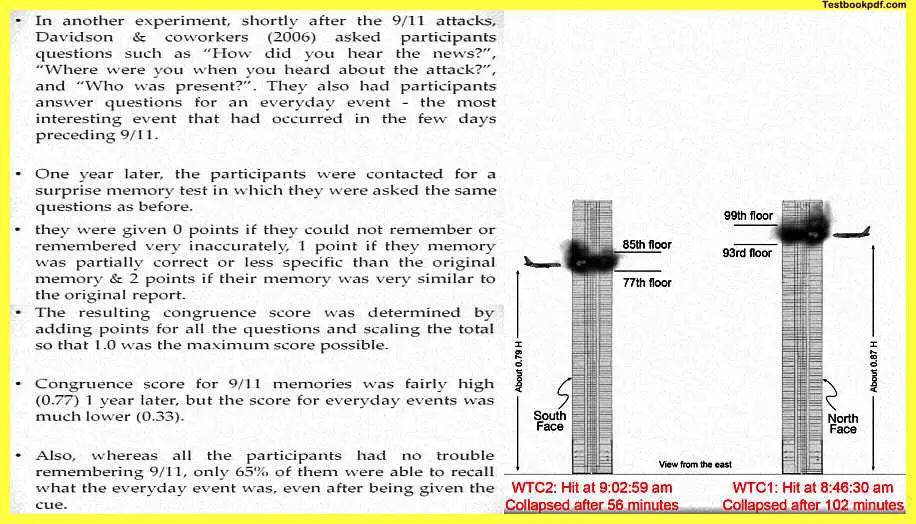
Now one year later participants are again contacted for a surprise memory test they had no clue that their memory will be tested at the point of the first test taken in which they were asked the same kind of questions. So they were given 0 points if they could not remember the event at all or very inaccurately 1 point if their memory was partially correct and less specific and 2 points if they matched exactly the one they had made originally. It is something congruence score was again determined by adding all these three scores it was found that the congruence is the score for 9/11 memories are fairly high their confidence and their report is fairly very high even one year later but this score for the everyday event much lower it goes to from .77 for the flashbulb memories 2.33 for the everyday events. Also, they found that as all the participants had no trouble remembering 9/11 only 65% of them were able to recall that everyday event we should have deputed in the first instance. Here you can see the results you will see that the percentage of people remembering something about 9/11 was almost 100% as only 65% of people remember anything about the everyday event.
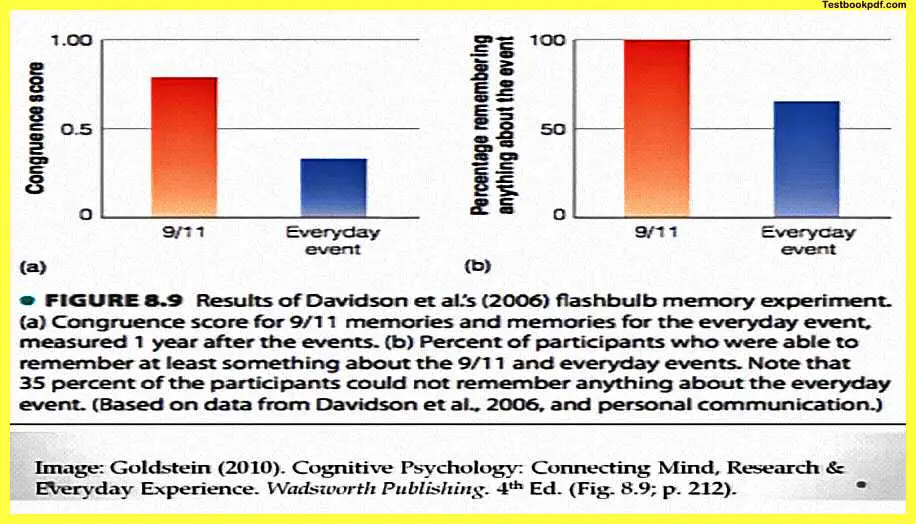
Now the result of both these studies or the studies we describing till now shows that memory for the flashbulb event does decline over time and not like a photograph as it was earlier side the poor recall of everyday events in the latter study could also be due to lack of good quality retrieval cues you see the study before this we did have participants of they did create some of the cues themselves so there will you could not explain this because of this fact but here they did not really have very good cue story remember the everyday events.
Now better memories for events like 9/11 might also probably be due to 2 characteristics first that these events are highly emotionally charging events so they test to better organization in the brain the second is causing these events to get the benefitted of added rehearsal now this befit of added rehearsal is referred to in the narrative rehearsal hypothesis and where those rehearsals come from it comes from a lot of discussion about these kinds of events. If it is a public event you would have experienced it in your own way then you would have read about it in the newspaper then you would have seen it on the television then you would have derive participated in the discussion about that event so what happens is time and again there is this rehearsal there is a narrative rehearsal that is happening sometimes you are participating in it sometimes there are other people you have just partly listening to it. So that rehearsal kind of revises this hold event again and again and your memory because better for each of these events but you remember this the number of rehearsal that is happening the number of rehearsal stories changing you might also be entertaining or including some of the false information about this event.
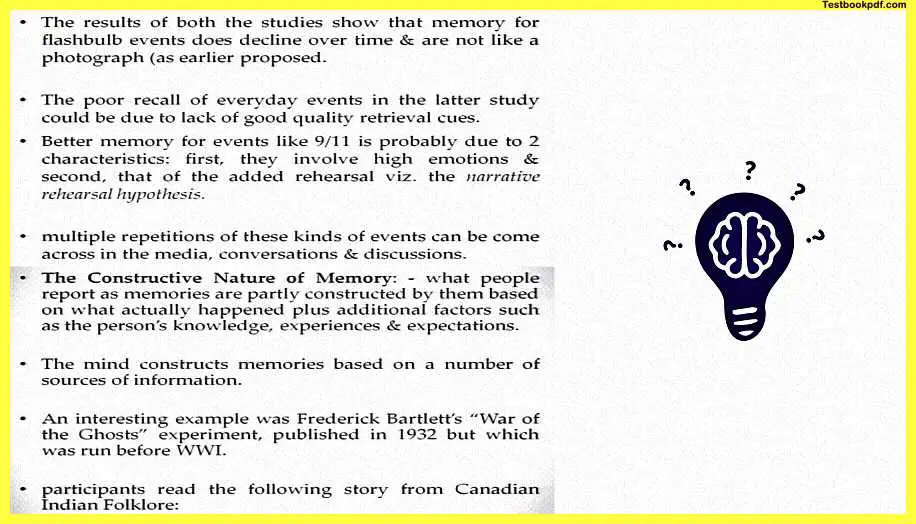
Now talking about false information there is a certain fact that memory has a very constructive nature you do not remember everything at the perfect time as it happens you might say for example adding a lot of things yourself based on what you are expectations are based on what you think about better though somebody to describe the event were in best friend and the person whom you do not like where involve having any coddle. And you are asked to relate this coddle to somebody else maybe even just for one day after the event happens your description might contain facts that, that absolve your friend of any guilt and put all the guilt on the person you did not like so much and it goes on known any kind of keeps in some misinformation so there is a very interesting experiment of Frederick Bartlett it is called of war of the ghosts experiment published in 1932 but that means done much earlier.
War of the Ghosts
So what happens is participants come to the room they read this passage about the ear of ghosts you were in the two gentlemen who worked with particular river and one of these gentlemen and they say can know 5, 6 people coming out of it from the river and they tell that we are going to make war and would you join us so one of these peoples say that I have no arrows so the other he tells to the other person that I have no arrows and I have not informed anybody at home where I am going so you should follow these people the other person follows these people more space they are fighting suddenly somebody’s hit with the arrow. It is the second young man who had gone with these people and has spoon as this person is hit with the arrow these people disappears they go somewhere and this person says oh maybe these people have come up come here with the world goes so he comes back he said he talks with people he says that I went with the ghost who fight the war and somebody you have said but I am completing fine then next day he wakes up he got blood and dies.
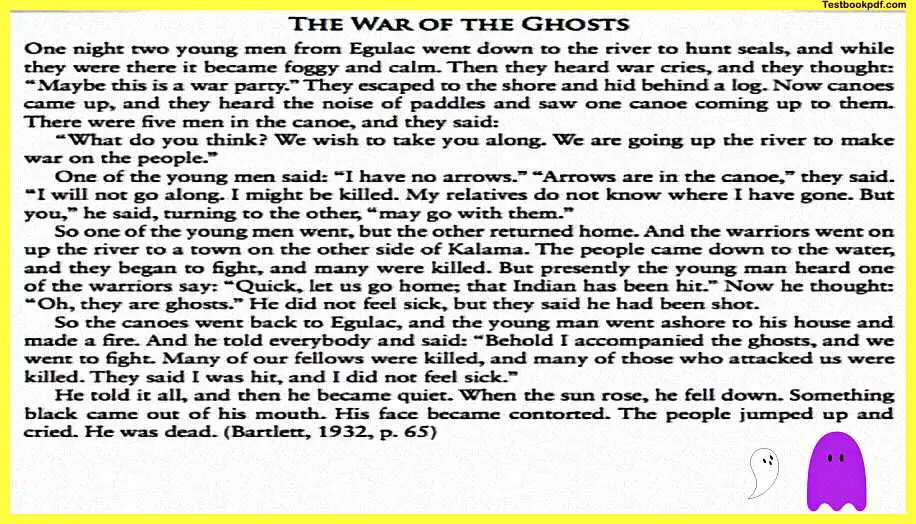
So again this event people were reading and Bartlett basically ask them to recall it as reproduction in which the same participants came back the number of times and it tried to remember the same story at longer and longer intervals after they first read it so at longer times what happens is after reading the story the participants were forgetting most of the accurate information from the passage.
So what they were doing is they were adding information out of their own head into this thing and the story was kind of getting changed and changed again and again after every reproduction that is what happens when a lot of new stories would hear an everyday lot of how roomers travel may faster and faster you was again this is the nature of memory, memory is in constructive by itself and you are bound to add something or the other from your own side knowingly slash unknowingly almost all the time. So this kind of change in the story could happen with the participants creating the memories from two sources first is the original stories and the second is whatever the knowledge they have to say for example somebody has some stereotype stereotypical knowledge that this would happen they kind of adding something hears.
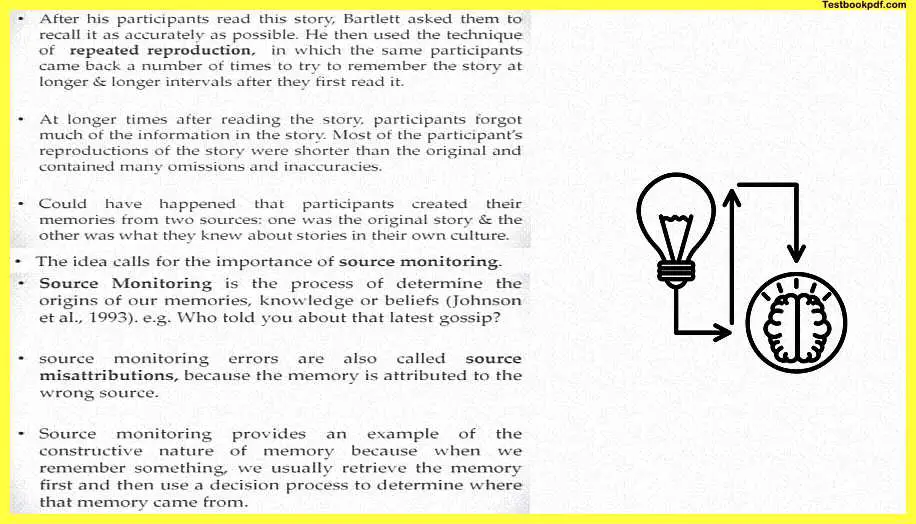
Now this idea specifically that people are adding something here calls for something called source monitoring
What is source monitoring?
Source monitoring basically is the process of determining the originals of our memories or the knowledge or our beliefs say for example what is the best humor you heard in a couple of days where did you hear this roomer from did you experience it did somebody tell you did you retrain the gossip where did you get this.
Now source monitoring errors there are also called source misattributions you misattribute the particular memory to the wrong source now source monitoring involves an example of the constructive nature of memory because when we remember something we usually retrieve the memory first and then you use the decision process to really check where did this memory come from where did I get this and knowledge about or otherwise you see people wondering who told me this. Did I read about it somewhere did somebody tell me those kinds of things you see people wondering about?

Now source monitoring errors are other common happens with everybody all the time but some of them could be rather sensational for example there is the case of cryptomnesia that happened with George Harrison who was part of the Beatle man and he was basically shot for appropriating the melody of a particular song from the Beatles, which is basically song which figured out in a much an earlier album from the group called Chiffons and the point is when the discussion happened, he said that I had been hearing this so much that I thought that it is mine. So it is again a misattribution that happened and it leads the person to believe that this is exactly the memory he create himself. So this could be the things there are again cases of primacy that happened all the time. But again some of them could be not really mistakes; somebody genuinely believes that what they have created.
Now source monitoring errors are important because the mechanism that leads to these source monitoring errors or source misattribution is generally the same mechanism that leads to the formation of memories in the channel. See if you are saying that you are suffering from the source monitoring errors you re-prompt to making so many source monitoring errors, it might be a good idea to really check everything that you have to say at some point. Because that is the same process that you are using to describe anything in general, all the memories you have in general are probably than our suffering from some kind of error, so you might to reach it before you assert something so confidently in a particular scenario.
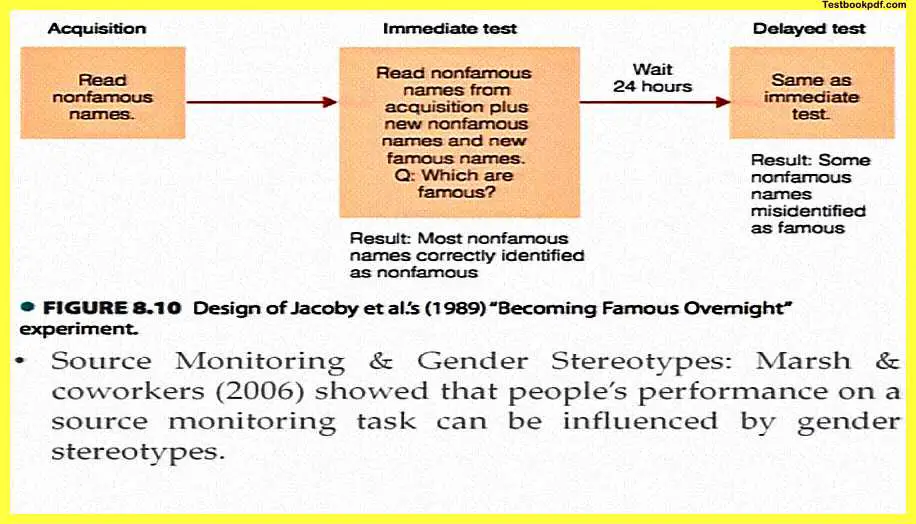
Now Johnson describes memory as a process that makes use of a number of types of information, he says at least 2 kinds of information that you might be billing upon. 1st is the primary source of information. That is information about the actual event if you were there if you were a party to the event if you are experiencing it for the first time that is one. The 2nd additional source of information is things like your knowledge of the world, the preceding events that might have, say for example coral, suppose one of the parties is involved in the coral, you do not like that person so much or you just hate that person. Automatically your description will start containing information that will put that person at guilt. Even though there is no guilt of that person, so you are bound to into the description of your event to bring in some of your personal bias and kind of color the event in that way.
So this is something which we have to be very careful about. An experiment towards about the same thing was done by. Jacob and co-workers in 1989 and it demonstrates the effect of source monitoring by testing the participant’s ability to distinguish between famous and non-famous. So what happens was in the acquisition part of the experiment the participants speed a number of non-famous names, things like you can take Indian names also if you want to imagine this.
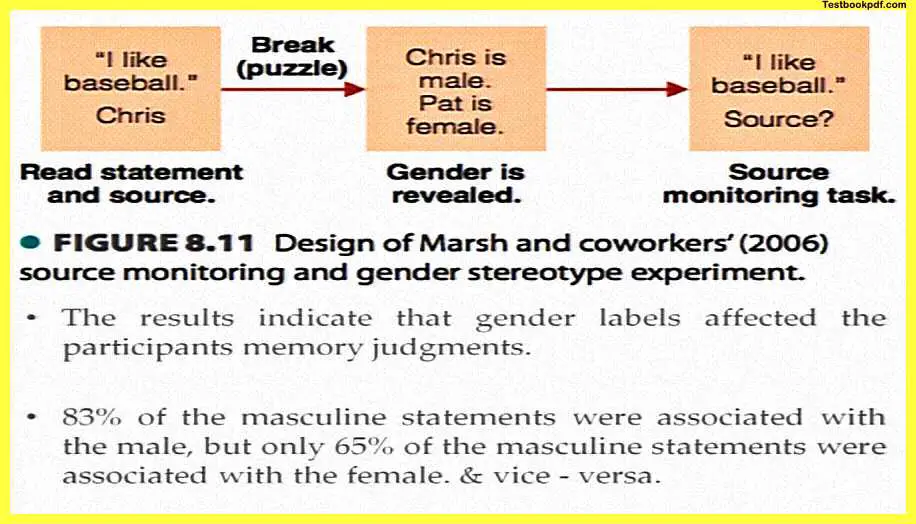
Now in the immediate test which happened after the participants saw the list of these non-famous names. They also saw a list of non-famous faces participants were told to pick out the names of famous people from a list of non-famous names that they have just seen, new non-famous names that they have not seen earlier, and some of the famous names. What happens here is that just before this test. They were told that all of the names that they have seen in the first part were non-famous because the test that has been given immediately, participants will mostly correctly recognize most of the older non-famous names that they were exposed to. In the delayed test 24 hours later what happened they were tested again on the list of the same names. Participants were more likely to recognize the old non-famous names as famous.
So what we are doing is they are doing this. If you read this in the 1st phase you read non-famous names, then they read non-famous names from the acquisition plus new non-famous names, and new famous names. Immediately if you tested they would recall the non-famous names much more easily but after they are tested after 24 hours they will actually take some of the non-famous names and identify them as famous names. So what they are doing is after 24 hours they are mixing the fact that some of these names are famous or some of these names are non-famous.
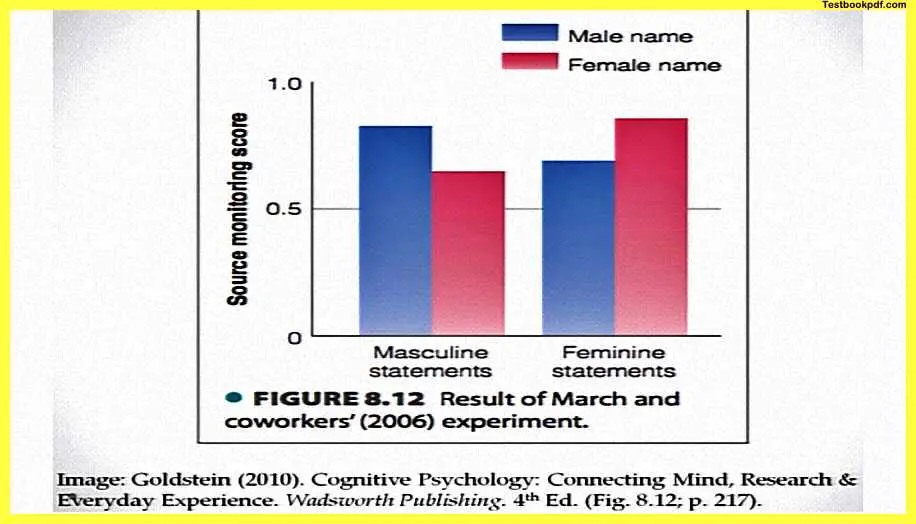
Now source monitoring also as I was saying stereotypes have also been found to be affected with the things like gender stereotypes. So, for example, marsh and coworkers 2006 showed that people’s performance on source monitoring tests can be influenced by gender stereotypes. So I will show you the example statement like baseball and I tell you that this was said by Chris. That I will give you a break and I will give you a puzzle, Chris is male pat is female gender is now revealed. Then I ask you, who would say that I like baseball? 90% you might say Chris because the Chris is the male person, I like some adventure sport and then I say this person is male and this is person female who would have said it. Because it is considered that the most of the adventure sports might be liked by men, so you might attribute the male name to that statement even though that might incorrect. The results do indicate in this experiment that gender labels did affect the participants’ memory, with 83% of masculine statements who are associated with the male and only 65% of masculine statements who are associated with the female and in the reverse case as well.

Now here you can see the masculine statement, male name better thing feminism statement less of the association.
Now real-world knowledge also affects memory formation as people make impressions about the stuff based on their experiences and knowledge. In a very classic experiment, Bransford and Johnson had participants read a number of action statements in the acquisition part of the experiment and then tested their same statement later. So those things like experiment group red john were trying to fix the birdhouse, he was pounding the nail when his father came out to watch him and helped him to do the work. In the control group john was trying to fix the birdhouse; he was looking for the nail when his father came out to watch him and helped him to do the work.
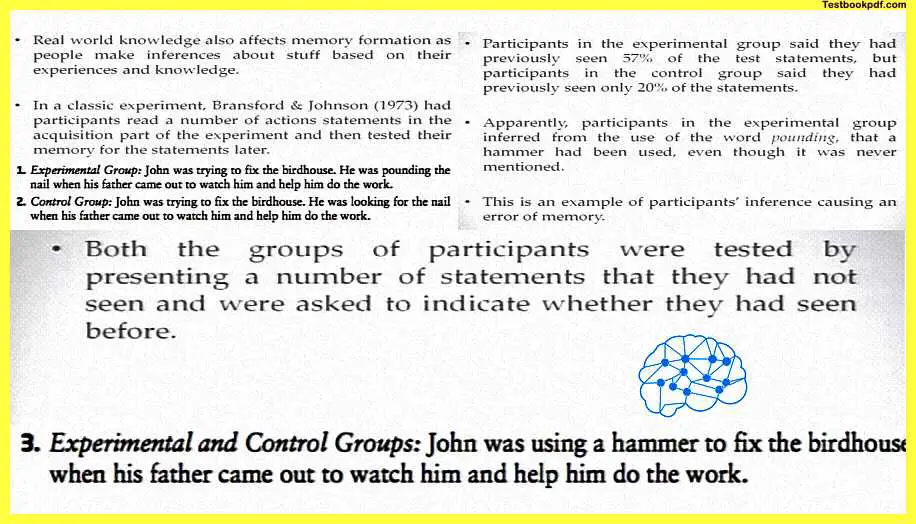
Now they were given a test statement. John was using the harmer to fix the birdhouse when his father came out to watch him, now the participants were asked a test question about whether they saw this sentence before. So if you see this sentence here did have the word hammer while in the other two they did not mention hammer at all but was about pounding and the other was looking for the nail. Participants in the experimental group said that they had previously seen 57% of the test statements.
So if they were pounding the wall they would say that I have seen a hammer, 57% as compared to the control group. Why because of the word pounding used in the 1st statement herein, a participant would infer directly that if he was pounding the nail he must have been doing it with the hammer. So automatically infer the role of the hammer there. So this is the experimental definition that you would see.
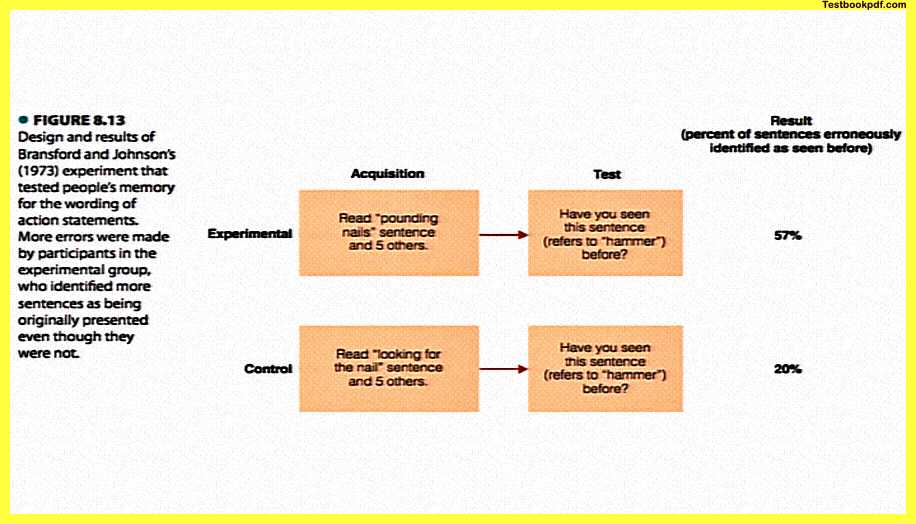
The acquisition phase read pounding nails and some other and hence it is tested, have seen this sentence before, the test sentence as hammer they would say yes, 57% in the control part looking for the nail have you seen this sentence before as hammer only 20% of the people. So sometimes these kinds are knowledge of the world might also influence your memories.
Now an interesting effect of this is the misinformation effect.
What is the Misinformation Effect?
The misleading information presented after the person witnesses an event can change how the person describes that event later, this is called the misinformation effect. So a classic experiment about this was done by Loftus and coworkers in 1978 wherein participants saw a series of slides in which a car stops at a stop sign and then turns around the corner and hits a pedestrian.
So some of the participants then answered the questions about a question like did another car pass the red datum while it was stopped at the stop sign or they were asked did another car pass the red Datsun while it was passed the yield sign, yield sign we already we have to stop. Those in this miss information group for more likely to say that they had seen the picture of the car stopped at the yield sign so they kind of made this missed information effect in another experiment Loftus and Palmer basically showed participants films of a car crash and then asked either how fast the participants were going when they smash the car into each other.
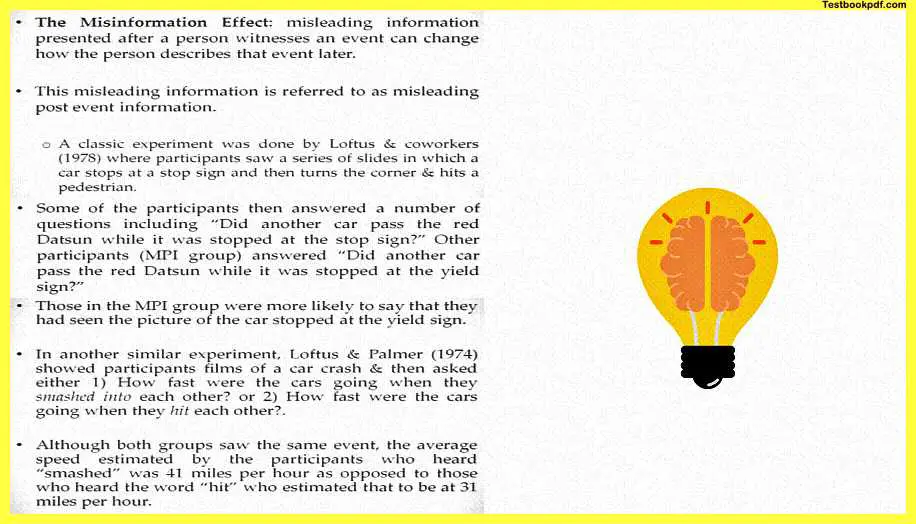
But how fast the car is going when they hit each other later participants were asked to estimate the speed of the car in the smash group they estimated the car speed to be around 41 miles per hour while in the hit group they estimated the speed of the car only to be at 31 miles per hour so use sees the word is also influencing their memory or that description of the event. Here is the figure of that experiment.
MPI
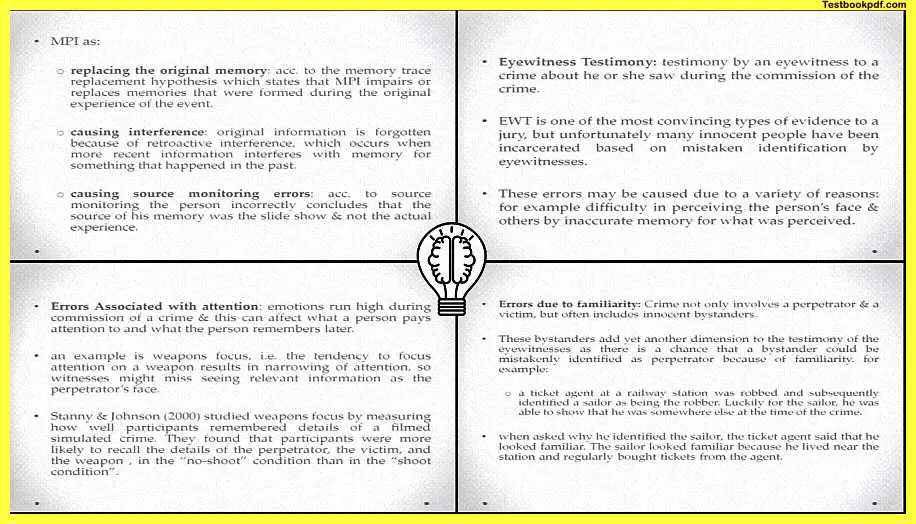
Now the MPI basically the miss information effect kind of as three explanations is first says that according it kind of replaces some misinformation kind of replaces the original memory so according to the memory trace replacement hypothesis or it states that MPI kind of impairs or replaces memories that were formed during the original experience of the event the other thing could be that this original information is forgotten. Because of retroactive interference so new information is causing information on the interferences on the older information which occurs also it could be because of source monitoring errors so according to the source monitoring hypothesis the person incorrectly concludes that these and information is the one that is actually the one they actual experiments so these three factors could be induced that have affected the personal memory. Another important factor here is the eyewitness testimony now testimony by an eyewitness I was talking about at the beginning about the crime can also be affected by this misinformation effect.
So eyewitness testimony however is considered to be one of the most convincing types of evidence through a particular jury but unfortunately, a lot of research has shown that a lot of times many innocent people have been incarcerated based on mistaken identification by eyewitnesses so these errors may be caused due to a variety of reasons difficulty in pursuing the persons face and others which lead to inaccurate may be for what was perceived.

An example is errors with attention a lot of times when weapons are involved in the crime scene participants mistakenly force all their attention to the weapon and because of the fault use of attention there do not remember they do not see the particular face in most cases and they will in that sense and they will in that sense miss identify the particular a lot of times so that is one standing in Johnson did this experiments he studied weapons forced by measuring how well the participants remember the details of a simulated crime they found that participants were more likely to recall the details of the perpetrator in a no shoot condition versus in a shoot condition where there was a weapon and which was allowed to shoot. So here is the figure of that experiment.
Now also errors could be due to familiarity a very interesting case happened a ticket agent at a railway station was robbed and it subsequently identified the seller has been later the slake showed that he was not at that particular place and the ticket asked why did you recognize the sailor the person says that I sailor seems too familiar for this sailor seem familiar because he was living very near to the station in every day brought ticket from the ticket agent so someday familiarity could also lead to errors. And errors like this which the person would not even know of a lot of times persons would be very convinced that no this is the exact person that has committed this particular crime so I hope this is telling you that our memories are not always accurate what actually seldom accurate and one has to be double shoot triple shoot of what you saying where this is information actually coming from now in a paper title good you identified this accept wells in bad filed this is a very nice experiment they had the participants view. The video of an actual crime and then asked them to identify the propitiator from a photo spread.
Feedback Effect
Now the photo spread does not really contain the actual perpetrator all of the participants recognized picked one of the photographs as the following choice and they received either confirmed feedback neutral feedback or disconfirmed feedback it was shown the people who received. The confirmed feedback actually identified. And for a very confident of their choice even though the photo spread did not actually contain the proprietor this is called the post identification feedback effect and this is something that creates a series of problems in the criminal justice system because jurors are strongly influenced by the confidence that these eyewitnesses in judgments so again something to think about.
Also, you might have seen in a lot of movies involving the court that the effect of post-questioning is also very important so in another question, Chan and coworkers basically did consider this question and they did that how does taking a recall test after witnessing an event before being exposed to misleading post-event information influence the memory.
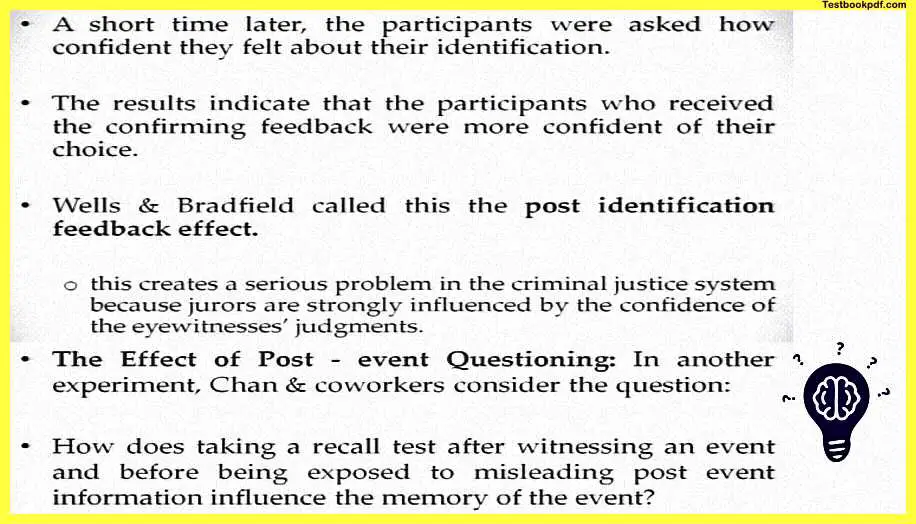
So what happened is there is an event happened and then you ask a lot of questions about that event to the person and the person kind tells you that whatever he remembers so this is a systematic view tape from 24 criminal. Thrillers series take a call test give some misinformation take a cued recall test after that 50% of the people are affected by the machine view the 24 tapes play some games something else give misinformation take a recall test only 20% of the people are affected by the misinformation so it shows that a lot of times. Taking an exact test doing this exact recall exercise which might be done a lot of times in somebody is in court also leads to problems if after immediately having a time is happened in police come and they question the person again and again might lead to misinformation might lead to somebody being to the proven to misinformation now is this revised testing effect happen this reverse testing basically shows a taking a recall test write after seeing a particular program or an event might make you more sensitive to misinformation.
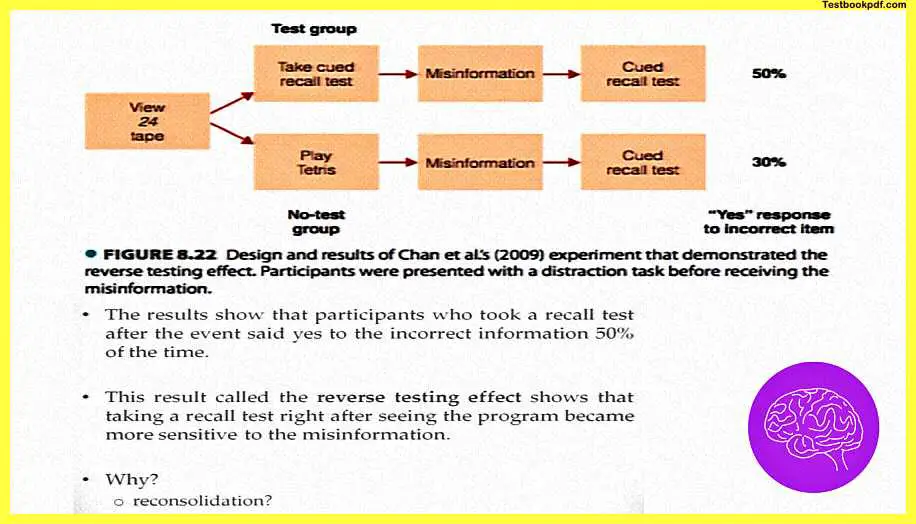
Now if you wondering why this more sensitiveness to misinformation is happening you might want to recall the last part of the previous article where in we were talking about reconsolidation so when you are actually going through a particular event again and again the memory would become it to be changed and then if somebody gives you misinformation somebody says something you might be affected by that.
So that is the whole point about everyday memories I probably showed you a lot of evidence that shows that our memory is not accurate all the time rather it is seldom accurate and one has to be double sure and very sure of where getting your description from where your memory is been sourced from I will thank you for this article we will talk about other topics in the next class thank you.
Read also:
Memory Psychology Pdf Download (Part-1)
Memory in Psychology Pdf (Part-3)
Psychology Memory Pdf (Part-4)
Memory Psychology Example (Part-5)
Psychology and Memory Pdf Download (Part-6)
